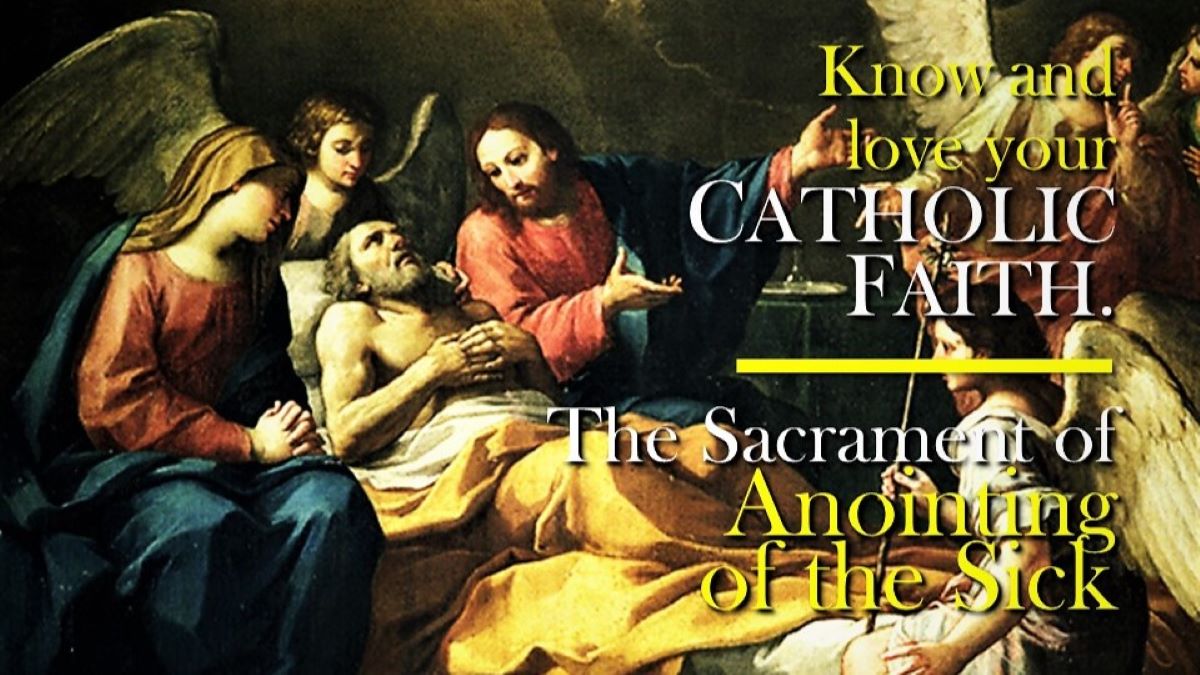THE SACRAMENT OF ANOINTING OF THE SICK
(Compendium of the Catechism of the Catholic Church nos. 313-320)
OUTLINE (Click on title links)
- How was sickness viewed in the Old Testament?
- What is the significance of Jesus’ compassion for the sick?
- What is the attitude of the Church toward the sick?
- Who can receive the sacrament of the anointing of the sick?
- Who administers this sacrament?
- How is this sacrament celebrated?
- What are the effects of this sacrament?
- What is Viaticum?
* The numbers preceding the answer to the question refer to the corresponding answers in the more complete Catechism of the Catholic Church.
313. How was sickness viewed in the Old Testament?
1499-1502*
In the Old Testament sickness was experienced as a sign of weakness and at the same time perceived as mysteriously bound up with sin. The prophets intuited that sickness could also have a redemptive value for one’s own sins and those of others. Thus sickness was lived out in the presence of God from whom people implored healing.
314. What is the significance of Jesus’ compassion for the sick?
1503-1505
The compassion of Jesus toward the sick and his many healings of the infirm were a clear sign that with him had come the Kingdom of God and therefore victory over sin, over suffering, and over death. By his own passion and death he gave new meaning to our suffering which, when united with his own, can become a means of purification and of salvation for us and for others.
315. What is the attitude of the Church toward the sick?
1506-1513
1526-1527
Having received from the Lord the charge to heal the sick, the Church strives to carry it out by taking care of the sick and accompanying them with her prayer of intercession. Above all, the Church possesses a sacrament specifically intended for the benefit of the sick. This sacrament was instituted by Christ and is attested by Saint James: “Is anyone among you sick? Let him call in the presbyters of the Church and let them pray over him and anoint him with oil in the name of the Lord” (James 5:14-15).
316. Who can receive the sacrament of the anointing of the sick?
1514-1515
1528-1529
Any member of the faithful can receive this sacrament as soon as he or she begins to be in danger of death because of sickness or old age. The faithful who receive this sacrament can receive it several times if their illness becomes worse or another serious sickness afflicts them. The celebration of this sacrament should, if possible, be preceded by individual confession on the part of the sick person.
317. Who administers this sacrament?
1516
1530
This sacrament can be administered only by priests (bishops or presbyters).
318. How is this sacrament celebrated?
1517-1519
1531
The celebration of this sacrament consists essentially in an anointing with oil which may be blessed by the bishop. The anointing is on the forehead and on the hands of the sick person (in the Roman rite) or also on other parts of the body (in the other rites) accompanied by the prayer of the priest who asks for the special grace of this sacrament.
319. What are the effects of this sacrament?
1520-1523
1532
This sacrament confers a special grace which unites the sick person more intimately to the Passion of Christ for his good and for the good of all the Church. It gives comfort, peace, courage, and even the forgiveness of sins if the sick person is not able to make a confession. Sometimes, if it is the will of God, this sacrament even brings about the restoration of physical health. In any case this Anointing prepares the sick person for the journey to the Father’s House.
320. What is Viaticum?
1524-1525
Viaticum is the Holy Eucharist received by those who are about to leave this earthly life and are preparing for the journey to eternal life. Communion in the body and blood of Christ who died and rose from the dead, received at the moment of passing from this world to the Father, is the seed of eternal life and the power of the resurrection.
+++END OF COMPENDIUM+++
SEE AS WELL:
WHAT MUST A CATHOLIC DO IF HE/SHE OR SOMEONE ELSE IS IN IMMINENT DANGER OF DEATH.
HOW MUST A CATHOLIC FACE ILLNESS AND SUFFERING
CONTINUOUS RITE OF PENANCE, ANOINTING OF THE SICK AND VIATICUM
Stay updated: subscribe by email for free TO OUR NEW WEBSITE catholicsstrivingforholiness.org (PUT YOUR EMAIL IN THE SUBSCRIBE WIDGET).
If you need some resources regarding a particular topic, feel free to use the search WIDGET which has access to thousands of posts, categories and tags on Catholic spirituality.
Cordially inviting you as well to follow www.fb.com/Catholicsstrivingforholiness. and share our posts to help more people in their Christian faith and life.
Thanks and God bless you and your loved ones! Fr. Rolly Arjonillo.
